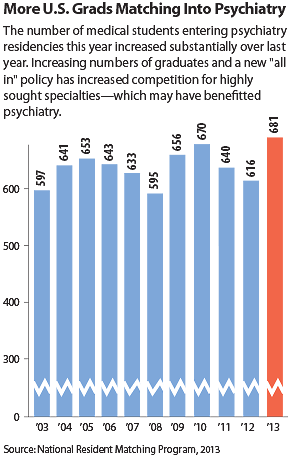More Graduates Choose Psychiatry in 2013 Match
Abstract
A new “all in“ policy for this year’s match, along with an increase in the number of medical students, contributes to the increase in graduates choosing psychiatry.
A total of 681 U.S. medical student seniors “matched” into psychiatry residencies in this year’s National Resident Matching Program (NRMP).
This is an increase from 616 in 2012, or from 3.9 percent to 4.2 percent of seniors selecting careers in psychiatry. The uptick in graduates entering the profession is good news for psychiatry, reversing a trend of several years in which the numbers were dropping. Last year’s figure of 616 was a decrease from 640 the year before and 670 in 2010.

The annual match, in which the choices of graduating medical students are paired with those of residency programs, is typically watched as an indicator of workforce size and makeup of the various medical specialties for the coming years. But a new wrinkle in the match program makes this year’s numbers harder to interpret—and may point to a significant problem for many medical school graduates.
This year the NRMP instituted an “all in” policy whereby residencies were required to enter all of their residency slots in the match. In past years, programs could participate in the NRMP by registering and filling some available residency positions, while also reserving some to be filled outside the match. In short, programs could decide which positions were “in” the match and which were “out.”
So with the “all in” policy there were more slots offered in the match: in psychiatry, 1,360 positions were offered (compared with 1,118 in 2012). And of the 1,360 slots, 1,330 were filled. Positions not filled by U.S. graduates were filled by international medical graduates (including U.S. and non-U.S. citizens), Canadian students, graduates of osteopathic schools, and students who graduated from medical school in previous years.
Sidney Weissman, M.D., a former APA Trustee and president of the American Association of Directors of Psychiatric Residency Training, noted that the inclusion of all available slots in the Match does not necessarily reflect an actual increase in residency opportunities. Meanwhile, there has been an increase in U.S. seniors from 16,527 in 2012 to 17,856 in 2013.
Weissman noted that this has greatly increased competition for certain specialties without a corresponding increase in residency slots. So some students with high class standing who only ranked those highly competitive specialties may not have found positions through the match.
And he also said it’s possible that some of the increase in U.S. graduates entering psychiatry is due to individuals choosing the field over more competitive specialties.
Weissman said that more than a 1,000 seniors did not find residency positions this year through the match. They then were able to compete for one of the 1,041 unfilled match positions, which are offered through the NRMP Supplemental Offer and Acceptance Program (SOAP). During SOAP, the NRMP makes available the locations of unfilled positions so that unmatched applicants can apply for them.
Weissman said reports indicate that after SOAP, some 500 U.S. seniors still did not have a position. He called attention to the reality that many of these students were more than $100,000 in debt.
The Association of American Medical Colleges (AAMC) has expressed concern about the reports of large numbers of unmatched graduates. Psychiatrist Darrell Kirch, M.D., president and CEO of the AAMC, said in a statement that the situation highlights the need for increased federal support of residency positions.
Kirch noted that there is a projected shortage of more than 90,000 doctors by 2020. “To avert the coming shortage, we need to begin today to increase the overall supply of physicians in this country by lifting the cap on residency training positions imposed in 1997 by the Balanced Budget Act,” he said. “Inaction will only mean extensive shortages of both primary care physicians and a wide range of specialists.”
AMA President Jeremy Lazarus, M.D., also cited the impending physician shortage and said that in light of the reports of graduates being unable to find residency training positions, the AMA had worked with Sens. Bill Nelson, Charles Schumer, and Harry Reid and Reps. Aaron Schock and Allyson Schwartz to introduce legislation to create additional positions.
“In keeping with the AMA’s historic leadership in physician education at all levels, we are also working to strategically reshape physician education in the United States to meet current and future workforce needs,” Lazarus said in a statement.
Weissman told Psychiatric News that while new factors may be affecting recruitment into psychiatry, this year’s numbers offer reason to be hopeful about the appeal of psychiatry to medical school graduates.
“We’ve seen a stabilization of interest in psychiatry,” he said. “With the naturally occurring fluctuations from year to year, we will continue to have to focus on varied recruitment strategies. We can use the implementation of the Affordable Care Act to demonstrate psychiatry’s unique role in health care.” ■
More information about the 2013 match is posted at http://www.nrmp.org/. Information about the new “all in” policy is posted at http://www.nrmp.org/allinpolicyexception.pdf.



